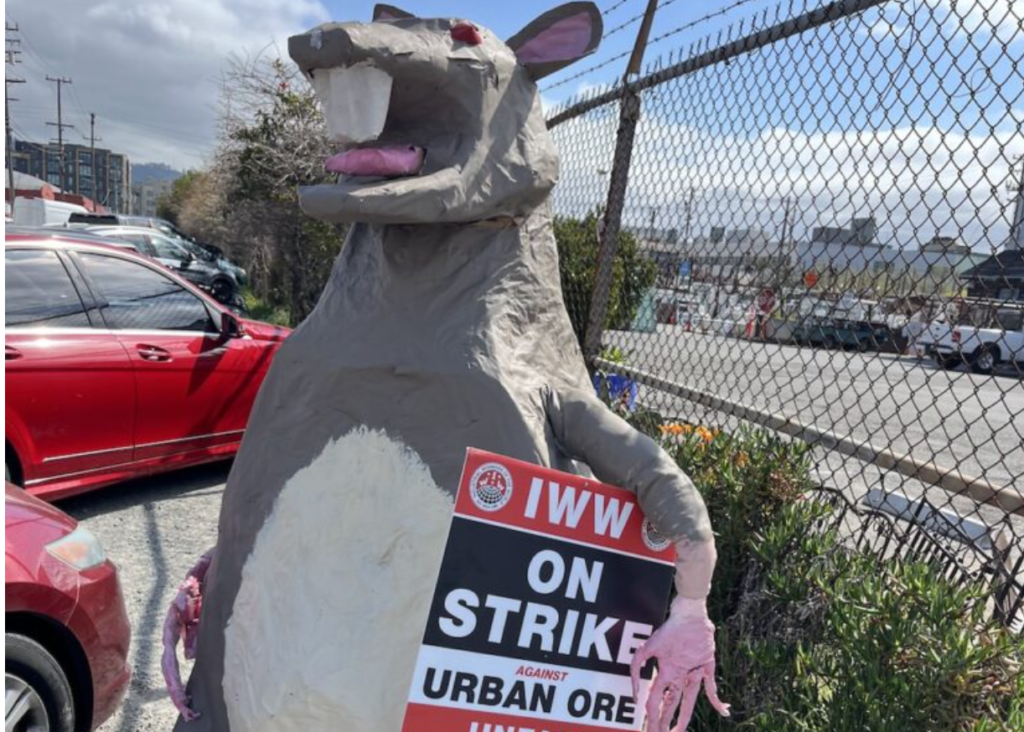Urban Ore workers suspended their strike in May with an expectation that ownership would reinstate all 11 bargaining unit workers who withheld their labor during the strike, per the agreement. The 45-day suspension ended June 15 and, as of this writing, none of the workers have been reinstated.
Owners Dan Knapp and Mary Lou Van Deventer offered reinstatement for about a third of the striking workers, saying insolvency prevented them from bringing all of the workers back at once. They’ve failed to provide financial evidence to the bargaining committee.

The strike suspension came after months of stalled negotiations that I’ve detailed in previous pieces. But the agreement, signed by both parties on April 30, outlined a path back for workers. If Urban Ore met an average monthly revenue goal of $220,000, then all the workers would be reinstated. Throughout May 2025, Urban Ore reached $270,000 in revenue and met a similar number in June.
“We now find that while we met the agreed measure, it unfortunately did not take into account the depth of our financial insolvency,” ownership said in a June 24 notice titled “Urban Ore Return to Work Proposal.”
That notice—a redacted version was shared with me—proposed “a phased approach to reinstatement” for four selected workers “based on the need for their particular skills.” Notably, the original suspension of strike agreement signed April 30 required ownership to bring all 11 workers back once the company met the agreed upon average monthly revenue goal.
During a June 24 bargaining session and in the notice sent the same day, the company admitted that it met the agreed upon revenue goals but implied that insolvency prevents all 11 workers from returning. The June 24 notice from ownership puts forward five criteria before reinstating all 11 workers including a 25 percent reduction in loans made by the owners and large bill payments.
In response, Urban Ore Workers Union requested “specific financial information that is necessary for the union to verify an inability to pay claim when it is relevant to a mandatory subject of bargaining” in accordance with federal labor law.
One worker I spoke with noted that the initial bargaining sessions after the April 30 suspension were positive, but once the company met the monthly revenue goal, they got more difficult and disorienting.
“We had a bargaining session on the 13th, at the end of that they were like… it came out in a tangential comment that they were only planning to reinstate a few people… And then we actually got their response or to plan for limited reinstatement on the 14th of June,” Spencer Jordan, formerly a salvager, said.
Ownership has categorized it as a matter of interpretation.
“But there is a difference of interpretation in whether laid-off staff have to be returned to work all at once, as the union thinks, or whether the company can phase in the returns as it can afford to pay more paychecks, as the company thinks,” Mary Lou Van Deventer, special projects manager, said in an email.
In said email, Van Deventer conceded that the company agreed to return all laid-off staff in the original strike suspension agreement. She explained that despite this initial agreement, the company couldn’t afford to bring all laid-off workers back citing a 60 percent income decrease due to the 40-day strike.
“After the loss of income during the strike, the company couldn’t pay all the staff who had previously worked,” said Van Deventer. She noted that layoffs were partly based on whether an employee was full time—which she categorized as more committed to the company—or part time, which she categorized as less committed.
Van Deventer detailed some specific issues, including scheduling and benefits, where ownership and the bargaining unit are still far apart but noted that she found 18 of 35 signed tentative agreements that worked for both parties.
That said, while noting the union’s legal right, Van Deventer categorized the tactics as “hostile and intrusive,” framing the bargaining unit’s financial requests as unreasonable with an impression that workers don’t care about the future of the company.
In my numerous conversations with several different workers, it’s always been clear that they’re drawn to Urban Ore for the mission and care very deeply about the company’s overall objectives. They want a deal and want to return to work. Unfortunately, it seems that may take a little longer.
“We’re still dealing with the same basic dynamic—they don’t think we have any legitimacy,” Jordan said in a phone interview.




